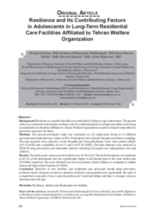This article describes how resilience is a means in which a person copes with tension. This article primarily discusses a study that was conducted to determine resilience and contributing factors in high-risk adolescents living in residential care facilities affiliated to Tehran Welfare Organization. By investigating resilience, the researchers hope to help develop effective preventive measures for adolescents living in long-term residential care facilities.
The study was conducted on 223 adolescents living in 15 different governmental residential care centers in 2014. The researchers used convenience sampling to select participants.
The study found that adolescents’ mean resilience was moderate with females scoring significantly higher than male adolescents.
The researchers concluded that directors of care facilities and residential care personnel should adopt preventive resilience-based strategies in order to optimize resilience among adolescents, particularly the male. It is important to provide a basis to prevent adolescents’ academic failure and place a stronger value on education than the past

